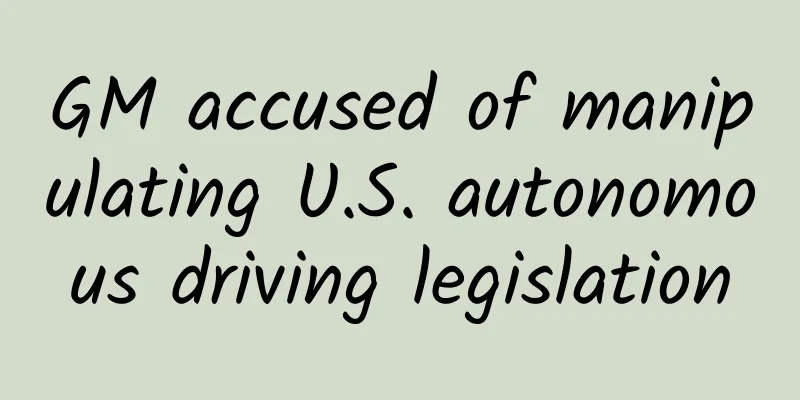GM accused of manipulating U.S. autonomous driving legislation

|
This year, at least five states — Georgia, Illinois, Maryland, Massachusetts and Tennessee — have proposed a series of regulations that would only allow automakers to deploy self-driving car technology on public roads. This means that companies such as Uber and Waymo (a spin-off of Google's self-driving car project) will not be able to operate self-driving cars in these states because they are currently developing self-driving car technology but are not engaged in car production. GM Chevrolet Tahoe self-driving car These proposed regulations follow the "SAVE Project" in Michigan's proposed regulations. On December 9, 2016, Michigan issued the first comprehensive autonomous driving regulations in the United States, covering the testing, sales, and application of autonomous vehicles. However, the "SAVE Project" stipulates that qualified automakers are authorized to operate an on-demand autonomous vehicle network for the public. (The on-demand autonomous vehicle network is similar to Uber's online car-hailing service.) Regarding how to be identified as an automobile manufacturer, the specific requirements are as follows: (A) The legal person manufactures an automated vehicle in the United States and the vehicle is certified to comply with all current Federal motor vehicle safety standards. (B) the legal person’s autonomous vehicles have driven at least 1 million miles on public roads in the United States while using the autonomous driving system and with a test driver. (C) The legal person must have a formal legal document of insurance, guarantee contract or company self-insurance, with a minimum coverage of USD 1 million, and must provide relevant insurance, guarantee contract or company self-insurance certificate as required by the Ministry of Transportation. The "SAVE Project" was protested by the technology companies involved, and Michigan eventually introduced a compromise bill: if companies such as Google, Uber, and Apple cooperate with automakers to develop and produce cars, or if their prototypes are approved by the U.S. Highway Traffic Safety Administration (NHTSA), these non-traditional automakers will be allowed to test and deploy vehicles on public roads. But so far, bills in Georgia, Illinois, Maryland, Massachusetts and Tennessee do not include similar compromise. Who is behind these restrictions? According to the Associated Press, lawmakers in four states said GM's government relations staff asked them to introduce legislation that would lay out plans for on-demand ride-sharing services using self-driving cars, but would require the vehicles to be owned by the automaker. GM has made shared mobility an important strategy, adding the personal mobility service brand "Maven" and integrating and expanding its multiple projects in the shared services field under this brand. GM has invested in Lyft, the second largest online ride-hailing service provider in the United States, and the Chevrolet Bolt electric car will be deployed in conjunction with Lyft in the shared mobility field. GM denied trying to suppress other brands. Harry Lightsey, GM's government relations officer, said that the lawmakers proposed these restrictive bills spontaneously and not at the behest of GM, but GM supports restrictions on the deployment qualifications of self-driving cars because "public recognition of this technology is very important, and if companies that cannot ensure safety are allowed to use this technology on streets and roads, it may have a very bad impact." But several lawmakers told the Associated Press that GM's government relations staff had asked them to introduce bills modeled after Michigan's law. Illinois Rep. Mike Zalewski, a Democrat, said he introduced the bill after talking to GM, which gave Zalewski $2,000 in campaign contributions, according to Illinois state records. GM also gave $2,500 to Republican Rep. Tom Demmer, a co-sponsor of the bill, and $3,500 to state Sen. Martin Sandoval, a Democrat. Maryland Sen. William Ferguson said he introduced the bill in part because GM wanted to expand its transmission plant near Baltimore to create more jobs. He said GM's government relations staff told him that "if more favorable (self-driving car) development and testing regulations are introduced, the company will definitely prioritize expansion in Maryland." After the Associated Press asked GM about the transmission plant, Sen. Ferguson sought to clarify his remarks, saying GM had not explicitly promised to expand operations. Tennessee Senator Mark Green, a Republican, hopes to reach a compromise. He said he would "take all sides" on the language he has been opposed to. GM has given $3,000 to Green's political action committee. A month before the bill was introduced, the bill's sponsor in the Tennessee House of Representatives, Republican William Lamberth II, accepted a $2,000 donation from GM. Zalewski and Lamberth said political contributions had nothing to do with their decision to introduce the bill. Green, Demmer and Sandoval did not respond to questions about political contributions. GM's government relations staff also urged lawmakers in other states to introduce similar bills. But several lawmakers said that despite GM's requests, they did not introduce bills because they felt such provisions would undermine fair competition. Colorado State Representative Faith Winter, a Democrat, said, "We don't want to pick winners and losers in the field of self-driving cars." Arizona State Senate Transportation Committee Chairman Senator Bob Worsley said that state lawmakers met with representatives of Governor Doug Ducey, GM, Waymo, Uber and Lyft last month to discuss the legislation that GM wanted to introduce. He revealed that only GM expressed support, and all other parties expressed opposition. David Strickland, general counsel of the Self-Driving Coalition for Safer Streets, a group representing Ford, Uber, Lyft and Volvo, and a former NHTSA administrator, said he opposes the proposed regulations. “By blocking or severely hindering the testing and deployment of fully self-driving vehicles by technology companies, these states are favoring one company over another and undermining the competitive environment. If a state wants to regulate self-driving vehicles, it must first ensure that the measures will clear obstacles to safe testing and deployment of vehicles and maintain a level playing field that is conducive to competition. We recommend that states focus on revising existing laws and regulations to be more inclusive of self-driving vehicles.” It is unclear whether the proposed regulations will be passed as is or if a compromise will emerge amid pressure from companies like Waymo and Uber. Federal regulators provided states and automakers with guidelines on self-driving safety last year but stopped short of issuing binding regulations. Eight states and the District of Columbia have enacted self-driving car regulations, and 21 states have proposed 55 related bills this year, according to the Alliance of Automobile Manufacturers. As a winner of Toutiao's Qingyun Plan and Baijiahao's Bai+ Plan, the 2019 Baidu Digital Author of the Year, the Baijiahao's Most Popular Author in the Technology Field, the 2019 Sogou Technology and Culture Author, and the 2021 Baijiahao Quarterly Influential Creator, he has won many awards, including the 2013 Sohu Best Industry Media Person, the 2015 China New Media Entrepreneurship Competition Beijing Third Place, the 2015 Guangmang Experience Award, the 2015 China New Media Entrepreneurship Competition Finals Third Place, and the 2018 Baidu Dynamic Annual Powerful Celebrity. |
<<: After the disappointment of 2016, will smart hardware make a comeback?
>>: Toyota's global personnel changes involve several senior executives in China
Recommend
A detailed practical strategy for public account data operation
Over the years, how many WeChat public accounts h...
Sleeping in on the weekends may reduce your risk of heart disease by 20%! Just get enough sleep →
Compiled by: Gong Zixin Can you really make up fo...
Stock Technical Analysis Tutorial
: : : : : : : : : : : : : : : : : : : : : : : : : ...
Suxuan·Workplace Growth Camp|Everything is under control and everyone can understand it
【Completed】[Career Growth Camp Tool Kit] 01|SOP M...
Only by placing accurate advertisements in this way can customers who really pay the bills see them.
In order to obtain the greatest benefits with the...
China's first special anti-COVID-19 drug takes effect immediately after infusion! An article reviews this "war without gunpowder"
Recently, my country's first special drug aga...
How powerful is the real-time rendering UI that makes me excited after reading the introduction?
Today, I want to share with you an instant render...
LeEco vs Xiaomi: A battle is inevitable
LeTV held a "breathtaking" press confer...
15-inch new MacBook Pro running points: significant performance improvement
Apple launched five new MacBook Pro Retina models ...
How to write good information flow copywriting ideas? 5 creative ideas to help you get inspiration quickly!
Due to the particularity of information flow adve...
iPhone 8/8 Plus real machine pictures, iPhone X real machine pictures and hands-on videos
While everyone was shouting that the iPhone X was...
One picture to understand丨The "blacklist" of released species: In addition to the alligator gar, there are also the ones you are familiar with>>
The seemingly benevolent act of "releasing a...
Zero-based fat reduction and body shaping—suitable for both men and women
Zero-based fat reduction and body shaping—suitabl...
Behind the war of words between Meizu and Smartisan: the smartphone dividend is no longer
Last Friday, the two most independent-minded CEOs...
A new "door" to functional materials! Femtosecond laser printing of artificial micro-vessels
Author: Duan Yuechu Li Jiawen, an associate profe...









